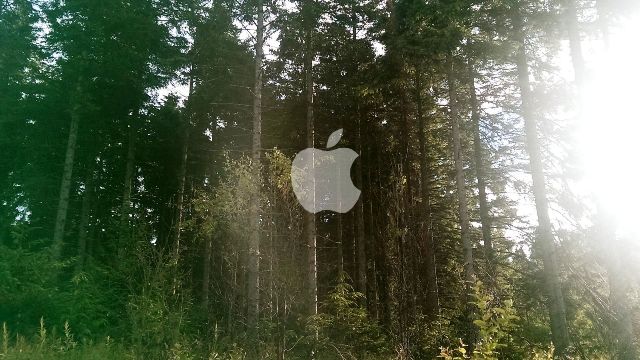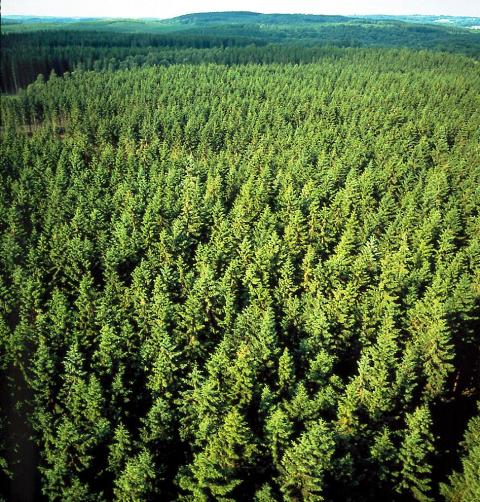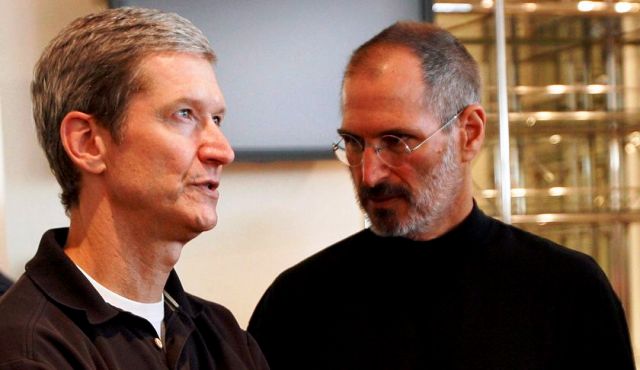
From making Apple 1 computers to iPhones and iPads, – Apple has proven itself once again. The company is teaming up with an ecological nonprofit organization to obtain approximately thirty-six thousand acres of exclusive forestland, which can be sustainably cultivated and utilized in Apple parcels.
The land, two tracts in N. Carolina and Maine, when combined spans an area twice the size of Manhattan. The management of the forest will be handled by The Conservation Fund. This particular terrain is part of an estimated forty-five million acres of private forest located in the United States, an area which might have been acquired by a corporation with less noble intentions.

“Apple planned to work with a company that had the means to obtain and take care of these forests, and we are delighted about this partnership. Apple is doing something unmatched here,” says Larry Selzer, The Conservation Fund’s president. Although Apple will gather materials off these woodlands, various other organizations will certainly be in a position to purchase outsourced materials from them. Selzer’s firm will handle the forests within the working forest model, in which attention is focused toward the long-term economic well-being of the woods during the cultivation of the tress.
Daniel Brindis, a Senior Forests Campaigner with Greenpeace, stated that working forests are an enhancement around clean trimming. However, this does not mean that this is a lasting remedy. There are more variables to be considered when determining responsible forest use. Merely buying a woodland will not always result in the firm managing the land appropriately .

“Visualize if every time you unsealed a packaging from a company you knew that it came from a working forest. And imagine if companies took seriously their material cycle and made sure that was renewable, just like energy. And think if they did not just buy an eco-friendly paper but took the step of guaranteeing – that they would stay working forests forever,” says Lisa Jackson, Apple’s vice president of environmental projects and former administrator of the United States Environmental Protection Agency.
Although, Apple refused to state exactly how much material it utilizes in its packaging, the organization does sell a countless amount of iOS products every twelve months. Each of these products are encased within packaging that is made up of up to one-third of un-repurposed materials. According to Jackson, the paper developed from these two forests is equivalent to nearly half the virgin material (used non-recycled — materials that were opted into iPhone, iPad, iPod, Mac and Apple TV packing previous year).
Apple has made it evident that they consider it their personal duty to address their personal carbon footprint, adding that if the company pays for day to day sustainably sourced paper, then subsequently they are not actually making the world a better place they are “zeroing out.” Apple has already been quite transparent in their goals to leave the world in a much better condition; that is one of their beliefs.

Indeed, this particular action comes during the time Apple seems to be thinking more profoundly about its social impact. Apple’s CEO Tim Cook, wrote a piece in the Washington Post decrying Indiana’s Religious Freedom Restoration Act. Plus, Apple has concentrated its efforts on ecological problems in particular for many years. The organization’s US establishments — sites, workplaces, data hubs, and what not — are all powered by renewable energy. In addition, Apple has also reduced its use of disputed minerals, and more recently revealed that it was creating an eight hundred and forty-eight million solar power farm in California. Just four years after positioning Apple last in a list of tech companies because of it previous carbon footprint, Greenpeace recently argued that other Fortune 500 C.E.O’s could benefit from the study of Tim Cook.
“I definitely feel like this company is stepping up to the plate and swinging for the fences in terms of not just being responsible, but using our voice. We believe that we have the responsibility to lead in this area. Tim has said over and over that there are certain places where we can lead. And if other companies take this approach, that is great. There are some ideas. That we do not mind people copying,” said Jackson. According to Jackson, Apple — alongside its substantial market share, worldwide presence, and with the capability to establish patterns of all types — is a well suited guide to other organizations considering their impact on the paper supply chain.
Get Your Anonymous T-Shirt / Sweatshirt / Hoodie / Tanktop, Smartphone or Tablet Cover or Mug In Our Spreadshirt Shop! Click Here
You want to support Anonymous Independent & Investigative News? Please, follow us on Twitter: Follow @AnonymousNewsHQ
This Article (It’s All About Going Green For Apple Now) is free and open source. You have permission to republish this article under a Creative Commons license with attribution to the author and AnonHQ.com.




